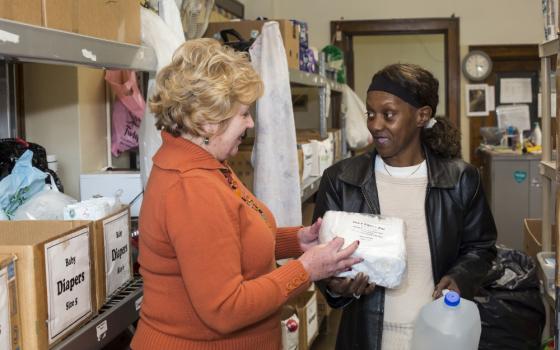The water crisis in Flint, Michigan, where the city water was found to have dangerous levels of toxic lead, is a stark reminder of many things, from how much we trust our public officials to ensure our safety to the critical importance of infrastructure.
But it should also be a reminder that for the vast majority of the developed world, clean, safe drinking water is a luxury we often take for granted. In the developing world, clean water is either a daily struggle or an impossibility, and the results are tragic.
Global Partners Running Waters is one of many groups trying to make a difference, and they've put together a video on their Facebook page that gives a good introduction to the work they do.
School Sisters of Notre Dame Sr. Jan Gregorcich and her friend Dianne Henke started the group after Gregorcich returned from 12 years of mission work in Guatemala, and Henke wanted to use an inheritance to help the people Gregorcich had served there.
A visit to Guatemala, where she saw the scarcity of potable water, convinced Henke that making clean, safe water available could transform life in a village, and GPRW was born.
Based in suburban Milwaukee, the group often partners with students at nearby Marquette University and has brought potable water to thousands of people who otherwise would go without.
A kick that kicked off a job offer
Like people around the world, Miguel Ángel Galán was outraged when he saw video of a Hungarian television reporter kicking and tripping refugees as they crossed the Hungarian border.
But when Galán found out the Syrian man with a child in his arms seen falling to the ground was a soccer coach, he knew he was in a unique position to make a difference, NPR reports.
NPR's story says Galán runs the largest soccer coaching school in Europe and was looking for someone to help strengthen the school's ties to the Arab world. Eventually, he was able to find the man, Osama Abdul Mohsen, and offer him a job in Spain.
"Within days, Abdul Mohsen arrived in Madrid with two of his sons, ages 17 and 8 — and a new job at Cenafe Academy, which sponsored his work visa. The Spanish government has granted them asylum," NPR reported.
The story says he manages to send about two-thirds of his wages to his wife and two other children in Turkey, where they are stuck waiting for Spain to give them asylum to the family can be reunited.
"In Spain, I am very happy. All the people here have been very, very good to me," he told NPR. "But I cannot live alone."
Immigration is integral to our nation
With all the debate over immigration policy, and some politicians proposing xenophobic ideas such as basing immigration on religion or forcing Muslims to register with the government (actions similar to the Nazi policies of the 1930s), the American Immigration Council asked what would happen if the proposal to remove all illegal immigrants from the United States were actually carried out.
The answer is economic disaster.
First, there would be the $12 billion cost of building the wall along the Mexico border that some propose, plus the estimated $750 million a year to maintain it — not to mention staffing it with border guards. And what would it accomplish? "A border fence would have no impact on at least half of the unauthorized immigrants entering the country, and its impact on the other half would be partial at best," the council says.
And then there is the removal of undocumented immigrants already here. The council cites a report from the conservative American Action Forum estimating the move would cost up to $300 billion and take 20 years to accomplish. And that's not counting the additional $315 billion in immigration enforcement costs required.
Oh, there's also the small matter of removing an estimated 11 million people from the economy, which would shrink the U.S. workforce by about 6 percent, leaving vast numbers of jobs unfilled. It would also remove 11 million consumers from a consumer-based economy, slowing the economy even further.
This, the council says, is a recipe for economic catastrophe.
And of course, the moral cost would be even higher.
Remember, links, tips and accounts of the response to any crisis anywhere in the world are always welcome at [email protected].
[Dan Stockman is national correspondent for Global Sisters Report. Follow him on Twitter @DanStockman or on Facebook.]

